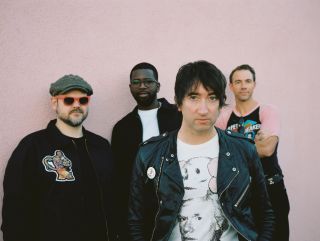Creativity
The Magic of the Band Plain White T’s
Singer-songwriter Tom Higgenson shares his creative process.
Posted November 30, 2023 Reviewed by Michelle Quirk
Key points
- We must have a respect for how difficult it is to identify, curate, and appreciate "magical" moments.
- "Magical" creative moments may emerge from happy or painful times.
- Sometimes we may find "magical" moments at times we least expect it, such as when we procrastinate.

We often describe important moments in our lives as “magical.” Perhaps we feel that magic when we fall in love, have children, achieve a career goal, or find a place or activity with which we really connect. These magical experiences seem to transcend the usual events of our regular life. Further, the pursuit of that magical feeling is often what gives us a sense of purpose. We want to find the people, places, and things that make our lives feel that magic. Unfortunately, while we know we want that magical feeling, we don't necessarily know how to attain it.
One way many of us attain that magical feeling is through music. We hear a song, album, or artist with whom we really connect, and, for a time, we are transported to a magical place. As time goes on, perhaps we remember special moments in our lives based on our favorite music at the time. One such song that many people consider “magical” is the Grammy-nominated hit song “Hey There Delilah” (2006) by the band Plain White T’s. In my case, "Hey There Delilah" was a song that was on the radio around the time my daughter was born, and it still evokes a sense of innocence and optimism we had at that special time in our lives.
And so, to gain a better understanding of how we may be able to identify, develop, and experience magical moments in our lives, I spoke with Tom Higgenson—singer-songwriter and founding member of Plain White T's. I wanted to talk with him about how he creates that magical feeling in his music, including their new song “Spaghetti Tattoo” off their self-titled 2023 album. And, in doing so, I hoped to discover some tips on how we may be able to discover those magical experiences in our lives.
So what did I learn about how we can create that magical feeling in our lives?
First, if we are going to commit to having magical moments in our lives, we need to start with the understanding and validation of how difficult this process is. In particular, many things that we need to focus on—responsibilities, stressors, obligations—may take our attention away from even realizing magical moments might be happening. And even for someone like Higgenson—who makes magic happen for a living—it is often very difficult to be "in the moment" so that we can identify, develop, and appreciate magical experiences in our lives: “I'm as guilty as anybody else … wanting to live in the moment, but then finding myself completely not … We'll go ... sit on the beach or something with family … Pretty easy to live in that moment, right? But a lot of times … I'm thinking of the next song or what I shouldn't be doing on social media to post about this upcoming release or something like that,” Higgenson told me. “And I have to kind of catch myself and be like, ‘Okay, wait a minute, just shut those things off, for now … Look around, enjoy this' … It's very easy to say 'live in the moment' … It's not always the easiest thing to do.”
Second, in part because the process of experiencing magical moments is so difficult, we need to have a strong respect for our efforts to find magic in our lives. For Higgenson, this sentiment manifests particularly in his respect for songs and the creative process of songwriting. “As a songwriter … I have such a high respect and regard for songs … that's kind of the dream to have a song that really reaches people and connects with people,” he explained. “All the songs like with Plain White T's, especially our big ones that have connected … I've loved them … I love music. And I love writing songs.”
Next, paradoxically, part of having a strong respect for our efforts to experience the magic in our lives is recognizing that not every moment will be magical. In Higgenson's case, it means that he realizes that not every song—in fact, most songs—won't be a hit like "Hey There Delilah." But you still treat every song as an attempt to cultivate that magical feeling. “You don't strike gold every time … You don't have that magic every time,” Higgenson said. “But … in the moment of creation, most of the time … Even when you're kind of writing a bad song ... you still have that same feeling … In that moment, everything I'm writing is like, is golden, you know? And it's not until you kind of sit back or listen back later or the next day, or like, play it for somebody where you're like … This is not as good as I thought.”
Fourth, one key concept that Higgenson uses to develop magical experiences is by paying attention to what he calls “small moments.” The idea is that magical experiences may not happen all at once, but can be built from a series of "small moments." In Higgenson's case, he often uses an acoustic guitar to discover these "small moments" for a song. “Some of our biggest hit songs … '[Hey There] Delilah' … 'Spaghetti Tattoo,' they're both … based around an acoustic guitar … a very, very small … moment, right? They're very intimate,” he described. “It just grabs you sometimes … it forces you to kind of listen, because it is a little quieter, because it is a little bit different than everything else that's out there … I feel like you're instantly kind of like … ‘Oh, what is this? I need to pay attention here.’”
Further, in part because magic can be built on small moments, Higgenson encourages patience in trying to create and experience magical moments. Sometimes magical moments happen more quickly. But other times it may take a while. “‘Spaghetti Tattoo’ … it was written in about two hours. So that was one of the actual rare exceptions where ... you come up with this initial spark ... and just take it to the finish line, right there,” Higgenson recalled. “When I wrote 'Hey There Delilah,' it was definitely like that little guitar part. I kind of stumbled on it and was like, 'Ooh, this is kind of nice … This is different.' But it wasn't like ... 'I've got to write this right now' … And then it wasn't until like a few weeks later, I had met the girl Delilah ... We joked around about me having a song about her.”
Finally, Higgenson suggests that not all "magical" experiences come from good times. While many of Higgenson’s hits are “love” songs, sometimes the magic comes from more difficult times. “When something's going wrong in your life, you know, it's much easier … to write about that,” Higgenson said. “When that girl that you love leaves you or when you guys have this fight, and you can't stand each other … Grab the guitar and write about that. Because that's when you really need to get that off your chest and you need to express yourself.”
One difficult time when Higgenson often finds inspiration is when he is procrastinating. “A lot of times, some of the best stuff comes from procrastination … It's like, ‘OK, I've got to leave at three o'clock … to meet somebody here. I still have to take a shower. It's 2:15. But you know what, for some reason, I feel like playing the guitar right now,” he described. “Sometimes the best stuff comes ... when you least expect it, or ... you least want it to come … Just give me an excuse to not take a shower right now. I gotta go write a song. And that's when the magic hits.”
Ultimately, Higgenson realizes that making magic in his music and life is a tough task. But he encourages us that it is well worth it. “I'm always kind of thinking and living … If you want to call it a dreamer. I honestly believed when I was ... writing that song that ... the world's gonna be different because of you ... It's like a romantic movie ... I love those movies," Higgenson said.
"Because it's like that one person just comes along and just shakes your whole world up, you know?”
Listen to the full conversation with Tom Higgenson here.




